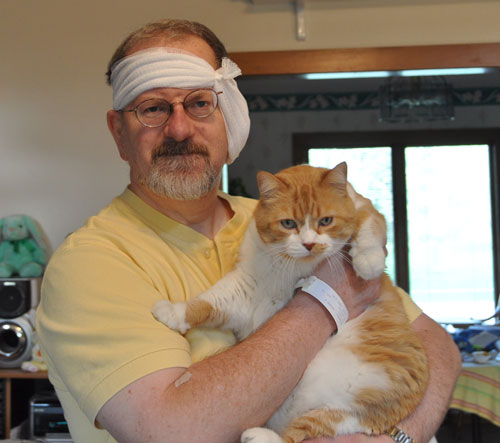
After my surgery, with Jordi.
Exactly one year ago, Pam and I were at a surgical center in Carmel, Ind., on the north side of Indianapolis. I had surgery to place (brace yourself) an endolymphatic shunt behind my left ear. The day after tax season ended for Pam, we got it done. The shunt would alleviate the vertigo symptoms of Meniere’s Disease, which I’d been battling since 2004. Now, when pressure builds up in my ear, a precursor to vertigo, fluid—in this case, only a couple drops, from what I understand—is channeled into the shunt.
Dr. Jerry House, an Indianapolis specialist, performed the surgery. I had been going to a well-regarded specialist in Fort Wayne, but he just kept prescribing more and more pills to take, and wouldn’t agree that I definitely had Meniere’s (which had been diagnosed several years before). I finally left his office with yet another prescription which I never filled.
I learned about Dr. House through my family doctor, and set up an appointment. He’s been around this block many times. After hearing my story and running me through a hearing test, he said, “You have Meniere’s Disease. Here are some things we can do for it.” He then presented the various surgical options, starting with the endolymphatic shunt, which was the least invasive and had a high success rate (90% after the first year, 70% after three years). Even though Dr. House is 90 miles away, Pam and I agree that switching to him was the best thing we could have done.
Because Meniere’s is such an erratic thing—it can go away for months at a time—I figured I wouldn’t have a good handle on how the shunt was working until the end of the year or later. So now it’s been a whole year. My evaluation?
It’s been a big, big help. I very rarely experience vertigo, and when I do, it is much less severe than before. I felt the shunt really starting to work around June. Sometimes I could sense a battle of sorts occurring in my head, with the shunt winning. My body would tell me, “You’re heading for a bad episode in a couple hours.” But it would never materialize.
I entered a period where it seemed like Meniere’s was pretty much gone from my life. Then, in July, I had acute pancreatitis, followed by the removal of my gall bladder. In early August I began experiencing some vertigo, and by the end of September it had gotten pretty bad, with vomiting episodes on consecutive days. I went to see Dr. House. He told me that acute pancreatitis messes up lots of body systems. He was surprised I didn’t have vertigo symptoms during my hospital stay. He said to just give it more time, and my body would get back in balance.
And that’s exactly what happened. Within a couple weeks, I was feeling great. Pam and I went on vacation, and I had no symptoms, and very few since then. From October to March, I was pretty much Meniere’s-free.
Ironically, as this anniversary occurs, I’ve been dealing with some vertigo issues. Two weeks ago, I had two nausea and vomiting episodes, which I just have to sleep off. But I hadn’t experienced that since September.
I’ve also had about 4 episodes of what is called a “nystagmus,” which is a brief attack where the eyes jerk back and forth quickly. I’ve had a few other episodes of nystagmus since September, usually traceable to a salty meal or too much intense work at the computer.
Vision is seriously impaired, but it lasts only 20 seconds or so. But the feeling of vertigo—of imbalance and unsteadiness—is minimized. So it’s nothing severe, nothing I can’t live with. But it’s there, a feeling in my head that things aren’t in balance. I’ve been carefully watching my intake of salt and caffeine.
I know it’ll eventually go away. Meniere’s cycles in and out like that. Dr. House told me, the only predictable thing about Meniere’s is that it’s unpredictable. As I write, it’s been a week since the last nystagmus (which occurred as I was waking up last Sunday morning). In a couple weeks, I’ll probably feel normal.
So again—my evaluation of the endolymphatic shunt surgery?
It’s been a huge help to me, and I have zero regrets about undergoing the surgery. I experience a small fraction of the vertigo I experienced before, and when I do, it is minimized, not nearly as severe. I still need to watch the usual Meniere’s triggers—salt, caffeine, and stress (the fourth trigger, alcohol, is a non-issue with this lifelong abstainer). I get to feeling so good that I sometimes get cocky, indulging a bit in salt and caffeine intake—and for the most part, I’ve gotten away with it. But a smart person, which I can be on occasion, would engage in moderation ALL of the time.
My various posts about the surgery:
- Now Proud Owner of an Endolymphatic Shunt (April 17, 2010)
- My Meniere’s Surgery, One Year Later (April 16, 2011)
- My Meniere’s Surgery, Two Years Later (April 16, 2012)
- Miniere’s Disease and the Barf Update (April 25, 2013)
- My Annual Meniere’s Disease Update (April 22, 2014)






67 Comments to My Meniere’s Surgery, One Year Later